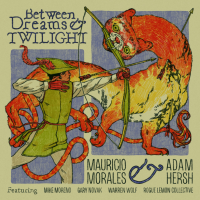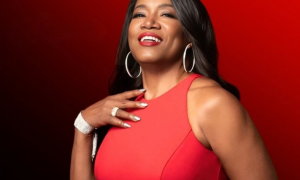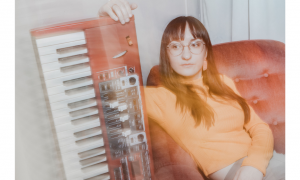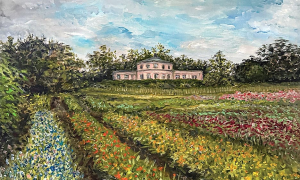
Very few musicians set out to influence people through the power of their music; they simply follow the heights of their artistic passions. Influence can't really be forced or created, it arises as a result of an artist's work; there's not really a formula that can guarantee the impact of music. An intensely focused passion towards performance and the willingness to try new things helps grab people's attention. An extreme dedication to the art form further impresses an audience and the continual return of an artist creates a connection. At the core of the experience, if a musician has something real to contribute to the world, they'll leave a lasting mark upon the world.
Cuban alto saxophonist and clarinetist Paquito D'Rivera lived his younger days ardently following his passion for music, eventually helping to create one of the island's most important bands. D'Rivera spent his childhood alongside his father Tito, a classical saxophonist who spent a great deal of time sharing the intricacies of the instrument with his son. Tito bought a curved soprano saxophone for Paquito and started training him on classical technique while exposing him to a wide variety of music through a large record collection. By the time that D'Rivera eleven years old, he was recognized as a child prodigy, performing as a soloist with the Havana Symphony and more. As he reached his early teens, jazz became his primary interest, leading him to musicians such as guitarist Pablo Cano and pianist Paquito Echeverría. Just as D'Rivera began to indulge his passion for improvisation, Fidel Castro brought Cuba under a communist ideology, and seeing jazz as a symbol of American culture, he outlawed the music. The opinions of Castro's government shifted with the tides of the world though, and in the late sixties, he needed to paint a different picture about the relationship between Cuba and jazz. As a result, the government brought together the island's best musicians under the guidance of Armando Romeu in the big band Orquesta Cubana De Musica Moderna. D'Rivera was the lead alto player in the band, and eventually served as the group's director for a short time. He worked alongside a number of important musicians in the group, including pianist Chucho Valdés, guitarist Emilio Morales, and bassist Carlos Del Puerto. Looking to form a group that could travel, Valdés, D'Rivera, Morales, Del Puerto, and percussionist Oscar Valdes formed Irakere. The group brought together the best pieces of jazz, Afro-Cuban tradition, and contemporary music, capturing crowds around the world with infectious hits like, “Bacalao Con Pan." Columbia Records signed Irakere in the late seventies, exposing them to an American audience, and bringing the Cuban musicians into the States. As Irakere brought their music into an awe-inspired world audience, D'Rivera began to see the possibilities of life as a jazz musician outside of Cuba.
Irakere's revolutionary musical mixture left a major mark upon the Latin Jazz world, making D'Rivera a respected and admired instrumentalist. As saxophonists around the world worked to catch up with his impressive technique and massive musicality, D'Rivera forged a blazing artistic path that was guided straight towards the stateside jazz scene. In Part One of our interview with D'Rivera, we looked at the impact of his father Tito upon his early musical development, his emergence as a young saxophone virtuoso, and his movement towards jazz. Today, we dig into D'Rivera's role in the Orquesta Cubana De Musica Moderna, the evolution of Irakere, and the group's growth.
LATIN JAZZ CORNER: What was the idea behind the Orquesta Cubana De Musica Moderna and how did that group come together?
PAQUITO D'RIVERA: That was a time where jazz music was a four-letter word in Cuba—literally! After many years of that thought, in 1967, they decided to create the Orquesta. There were a lot of left wing people going to Cuba, attending congresses and visiting. So the government decided to create an image that jazz was not forbidden and that nothing was forbidden there. So they created the Orquesta to play American music—that is incredible. It was to create a different image than what they had created all those years. So they created the Orquesta and after a while, the Orquesta ceased to achieve the function that it was created for and it disappeared.
But it was a great opportunity for us to get together and play. They put together the greatest musicians in the country and made a big band. Armando Romeu, who used to be the conductor of The Tropicana Orchestra for twenty-five years, was selected to be the conductor of the Orquesta. It was fun. Chucho Valdes was in the Orquesta, as well as the guitarist Carlos Emilio, myself, and a lot of guys, it was fun.
LJC: What was the repertoire like in that band—was it jazz like what was going on in the States or was it something different?
PDR: It was a combination of all that. There was some Cuban music, but it was very jazz oriented.
LJC: Didn't you direct the band for a couple of years?
PDR: I directed the band for two years. When I decided that I wanted to play only jazz in the Orquesta, then I got fired.
LJC: At that point, you had a forced retirement by order of the government, were you playing at all?
PDR: It was two years. No, I wasn't really playing. I did make a trio in those days just for fun. It was a free jazz trio with Emiliano Salvador on drums and some piano and Carlos del Puerto playing the bass. Emiliano was a very good drummer. He was like a Cuban version of Roy Haynes. He played in that same style, that broken style that Roy Haynes uses.
LJC: Wow, are there any recordings of that?
PDR: No, I don't think so. We played around in some places—houses, musicians' homes, and jam sessions. It was a pretty good trio.
LJC: Did you play much with Emiliano Salvador in his group? I've heard you on his Nueva Visionrecording.
PDR: I was the conductor on Nueva Vision, because Emiliano hated to conduct, to direct the group. So I was the conductor on that recording. Emiliano was so talented, extremely talented.
LJC: You guys put together Irakere with members of the Orquesta; how did the idea for Irakere come about?
PDR: It was Chucho, Emilio, Carlos, and Oscar Valdes, the singer/percussionist—they wanted to put a group together to travel. It was very simple! We didn't know that we were going to have such an impact in jazz and Latin music around the world. We were just working to do something good. The first group was Jorge Varona on the trumpet and me playing the baritone and my curved soprano.
The first piece that we recorded was “Bacalao Con Pan," and that was an instant success. We didn't really expect it to be such a success. Oscar had never been a singer before; he had a very good voice, but he was never a singer. So Chucho encouraged him to sing, and it was a success.
LJC: I've heard that there was an effort to hide jazz in Cuban music through Irakere; was there that intention to make it a jazz group?
PDR: The idea was to hide the word jazz as much as possible, which is not an easy task, especially when all the players are jazz musicians. The idea was to hide it, like, don't mention the word jazz here—don't tell and don't ask! We discovered this before the American government—don't tell, don't ask!
LJC: Was there a lot of government intervention?
PDR: From some people. Some people in the government would say, “They are jazz players! They want to play the role like they're not jazz players, but they are." It was an accusation! For them, it was kind of like saying, “They are cocaine dealers!" Chucho denied it; he would say, “We are not playing jazz, we are playing contemporary Afro-Cuban music."
But now it's different, now they even have a jazz festival down there. Chucho is in charge of that, but the person that created the festival is Bobby Carcasses. Bobby started the jazz festival and I was his assistant at the first festival.
LJC: One of my favorite moments on those early Irakere albums is the Mozart piece that you do as a bluesy jazz piece.
PDR: I wrote that piece only as an experiment. I didn't mean to have that piece in the repertoire. I came to a rehearsal and I said, “Chucho, after the rehearsal, I have something here that I would like to play for you." He said, “No, no, no, do it now." I said, “No, it's not for the group, it's just an experiment that I want to do." But he said, “No, let's do it." He loved it, and then he said, “Let's play it tonight at the dance party!" I said, “The dance party and a Mozart piece? No, no, don't do that, they are going to kill us." But he said, “Well, let's do it and see what happens." It was an instant success—people loved that! I don't know how it worked out. I was very scared—playing Mozart at a dance party was very uncommon. But we had to play it at every dance party after that.
LJC: Did you contribute a lot to Irakere in terms of writing and direction or was it more Chucho leading the group?
PDR: Most of the time, Chucho didn't like to conduct. It was like Emiliano; Chucho didn't like to conduct, so I would conduct in the early group. Chucho was the director of course, but he asked me to conduct the group for a while. Then later on, he felt more confident and he took the direction of the group. He was always the director, but I did the conducting for years. I did contribute some pieces, but he wrote most of the material.
LJC: In the late seventies, Columbia Records signed Irakere and your toured the U.S.—how did change your perspective on jazz?
PDR: The first time we came into contact with American musicians was actually in 1977, when the big boat called the Daphne arrived in Havana. Of course, there was nothing written in the papers about it, it was a surprise to everybody. On that boat, they had Dizzy Gillespie, Stan Getz, David Abrham, Arnold J. Smith, and people like that.
LJC: So that was the first time that you met Dizzy then, in 1977?
PDR: Yes, I talk about it in my new book—there's a story in there called Sherlock Holmes in Havana. Dizzy came to Havana and he brought a cape, the hat with two visors, and the big pipe—he looked like Sherlock Holmes with a heavy suntan. Arturo Sandoval took him to my house and I was not there. Then later at the grocery store on the corner, the guy working there told me, “There was a guy here looking for you, he was dressed like Sherlock Holmes." I said, “No, here in Havana, it's too hot for that." He said, “Well, he was sweating like crazy and he was holding that cape!" Then later I found out it was Dizzy Gillespie!
LJC: So you got to play with him and talk to him about jazz in the States . . .
PDR: That changed my life. And then there was Willis Conover, who was my hero. He had a show on Voice of America for many, many years. It was called the Jazz Hour on Voice Of America. For us, it was very hard to find recordings. So Willis Conover had this wonderful program, and through him, we found out about the new Miles Davis Quintet with Herbie Hancock and Tony Williams, about Joe Henderson, and Woody Shaw, and the Mel Lewis-Thad Jones Big Band. It was thanks to Willis Conover.
Cuban alto saxophonist and clarinetist Paquito D'Rivera lived his younger days ardently following his passion for music, eventually helping to create one of the island's most important bands. D'Rivera spent his childhood alongside his father Tito, a classical saxophonist who spent a great deal of time sharing the intricacies of the instrument with his son. Tito bought a curved soprano saxophone for Paquito and started training him on classical technique while exposing him to a wide variety of music through a large record collection. By the time that D'Rivera eleven years old, he was recognized as a child prodigy, performing as a soloist with the Havana Symphony and more. As he reached his early teens, jazz became his primary interest, leading him to musicians such as guitarist Pablo Cano and pianist Paquito Echeverría. Just as D'Rivera began to indulge his passion for improvisation, Fidel Castro brought Cuba under a communist ideology, and seeing jazz as a symbol of American culture, he outlawed the music. The opinions of Castro's government shifted with the tides of the world though, and in the late sixties, he needed to paint a different picture about the relationship between Cuba and jazz. As a result, the government brought together the island's best musicians under the guidance of Armando Romeu in the big band Orquesta Cubana De Musica Moderna. D'Rivera was the lead alto player in the band, and eventually served as the group's director for a short time. He worked alongside a number of important musicians in the group, including pianist Chucho Valdés, guitarist Emilio Morales, and bassist Carlos Del Puerto. Looking to form a group that could travel, Valdés, D'Rivera, Morales, Del Puerto, and percussionist Oscar Valdes formed Irakere. The group brought together the best pieces of jazz, Afro-Cuban tradition, and contemporary music, capturing crowds around the world with infectious hits like, “Bacalao Con Pan." Columbia Records signed Irakere in the late seventies, exposing them to an American audience, and bringing the Cuban musicians into the States. As Irakere brought their music into an awe-inspired world audience, D'Rivera began to see the possibilities of life as a jazz musician outside of Cuba.
Irakere's revolutionary musical mixture left a major mark upon the Latin Jazz world, making D'Rivera a respected and admired instrumentalist. As saxophonists around the world worked to catch up with his impressive technique and massive musicality, D'Rivera forged a blazing artistic path that was guided straight towards the stateside jazz scene. In Part One of our interview with D'Rivera, we looked at the impact of his father Tito upon his early musical development, his emergence as a young saxophone virtuoso, and his movement towards jazz. Today, we dig into D'Rivera's role in the Orquesta Cubana De Musica Moderna, the evolution of Irakere, and the group's growth.
LATIN JAZZ CORNER: What was the idea behind the Orquesta Cubana De Musica Moderna and how did that group come together?
PAQUITO D'RIVERA: That was a time where jazz music was a four-letter word in Cuba—literally! After many years of that thought, in 1967, they decided to create the Orquesta. There were a lot of left wing people going to Cuba, attending congresses and visiting. So the government decided to create an image that jazz was not forbidden and that nothing was forbidden there. So they created the Orquesta to play American music—that is incredible. It was to create a different image than what they had created all those years. So they created the Orquesta and after a while, the Orquesta ceased to achieve the function that it was created for and it disappeared.
But it was a great opportunity for us to get together and play. They put together the greatest musicians in the country and made a big band. Armando Romeu, who used to be the conductor of The Tropicana Orchestra for twenty-five years, was selected to be the conductor of the Orquesta. It was fun. Chucho Valdes was in the Orquesta, as well as the guitarist Carlos Emilio, myself, and a lot of guys, it was fun.
LJC: What was the repertoire like in that band—was it jazz like what was going on in the States or was it something different?
PDR: It was a combination of all that. There was some Cuban music, but it was very jazz oriented.
LJC: Didn't you direct the band for a couple of years?
PDR: I directed the band for two years. When I decided that I wanted to play only jazz in the Orquesta, then I got fired.
LJC: At that point, you had a forced retirement by order of the government, were you playing at all?
PDR: It was two years. No, I wasn't really playing. I did make a trio in those days just for fun. It was a free jazz trio with Emiliano Salvador on drums and some piano and Carlos del Puerto playing the bass. Emiliano was a very good drummer. He was like a Cuban version of Roy Haynes. He played in that same style, that broken style that Roy Haynes uses.
LJC: Wow, are there any recordings of that?
PDR: No, I don't think so. We played around in some places—houses, musicians' homes, and jam sessions. It was a pretty good trio.
LJC: Did you play much with Emiliano Salvador in his group? I've heard you on his Nueva Visionrecording.
PDR: I was the conductor on Nueva Vision, because Emiliano hated to conduct, to direct the group. So I was the conductor on that recording. Emiliano was so talented, extremely talented.
LJC: You guys put together Irakere with members of the Orquesta; how did the idea for Irakere come about?
PDR: It was Chucho, Emilio, Carlos, and Oscar Valdes, the singer/percussionist—they wanted to put a group together to travel. It was very simple! We didn't know that we were going to have such an impact in jazz and Latin music around the world. We were just working to do something good. The first group was Jorge Varona on the trumpet and me playing the baritone and my curved soprano.
The first piece that we recorded was “Bacalao Con Pan," and that was an instant success. We didn't really expect it to be such a success. Oscar had never been a singer before; he had a very good voice, but he was never a singer. So Chucho encouraged him to sing, and it was a success.
LJC: I've heard that there was an effort to hide jazz in Cuban music through Irakere; was there that intention to make it a jazz group?
PDR: The idea was to hide the word jazz as much as possible, which is not an easy task, especially when all the players are jazz musicians. The idea was to hide it, like, don't mention the word jazz here—don't tell and don't ask! We discovered this before the American government—don't tell, don't ask!
LJC: Was there a lot of government intervention?
PDR: From some people. Some people in the government would say, “They are jazz players! They want to play the role like they're not jazz players, but they are." It was an accusation! For them, it was kind of like saying, “They are cocaine dealers!" Chucho denied it; he would say, “We are not playing jazz, we are playing contemporary Afro-Cuban music."
But now it's different, now they even have a jazz festival down there. Chucho is in charge of that, but the person that created the festival is Bobby Carcasses. Bobby started the jazz festival and I was his assistant at the first festival.
LJC: One of my favorite moments on those early Irakere albums is the Mozart piece that you do as a bluesy jazz piece.
PDR: I wrote that piece only as an experiment. I didn't mean to have that piece in the repertoire. I came to a rehearsal and I said, “Chucho, after the rehearsal, I have something here that I would like to play for you." He said, “No, no, no, do it now." I said, “No, it's not for the group, it's just an experiment that I want to do." But he said, “No, let's do it." He loved it, and then he said, “Let's play it tonight at the dance party!" I said, “The dance party and a Mozart piece? No, no, don't do that, they are going to kill us." But he said, “Well, let's do it and see what happens." It was an instant success—people loved that! I don't know how it worked out. I was very scared—playing Mozart at a dance party was very uncommon. But we had to play it at every dance party after that.
LJC: Did you contribute a lot to Irakere in terms of writing and direction or was it more Chucho leading the group?
PDR: Most of the time, Chucho didn't like to conduct. It was like Emiliano; Chucho didn't like to conduct, so I would conduct in the early group. Chucho was the director of course, but he asked me to conduct the group for a while. Then later on, he felt more confident and he took the direction of the group. He was always the director, but I did the conducting for years. I did contribute some pieces, but he wrote most of the material.
LJC: In the late seventies, Columbia Records signed Irakere and your toured the U.S.—how did change your perspective on jazz?
PDR: The first time we came into contact with American musicians was actually in 1977, when the big boat called the Daphne arrived in Havana. Of course, there was nothing written in the papers about it, it was a surprise to everybody. On that boat, they had Dizzy Gillespie, Stan Getz, David Abrham, Arnold J. Smith, and people like that.
LJC: So that was the first time that you met Dizzy then, in 1977?
PDR: Yes, I talk about it in my new book—there's a story in there called Sherlock Holmes in Havana. Dizzy came to Havana and he brought a cape, the hat with two visors, and the big pipe—he looked like Sherlock Holmes with a heavy suntan. Arturo Sandoval took him to my house and I was not there. Then later at the grocery store on the corner, the guy working there told me, “There was a guy here looking for you, he was dressed like Sherlock Holmes." I said, “No, here in Havana, it's too hot for that." He said, “Well, he was sweating like crazy and he was holding that cape!" Then later I found out it was Dizzy Gillespie!
LJC: So you got to play with him and talk to him about jazz in the States . . .
PDR: That changed my life. And then there was Willis Conover, who was my hero. He had a show on Voice of America for many, many years. It was called the Jazz Hour on Voice Of America. For us, it was very hard to find recordings. So Willis Conover had this wonderful program, and through him, we found out about the new Miles Davis Quintet with Herbie Hancock and Tony Williams, about Joe Henderson, and Woody Shaw, and the Mel Lewis-Thad Jones Big Band. It was thanks to Willis Conover.


























